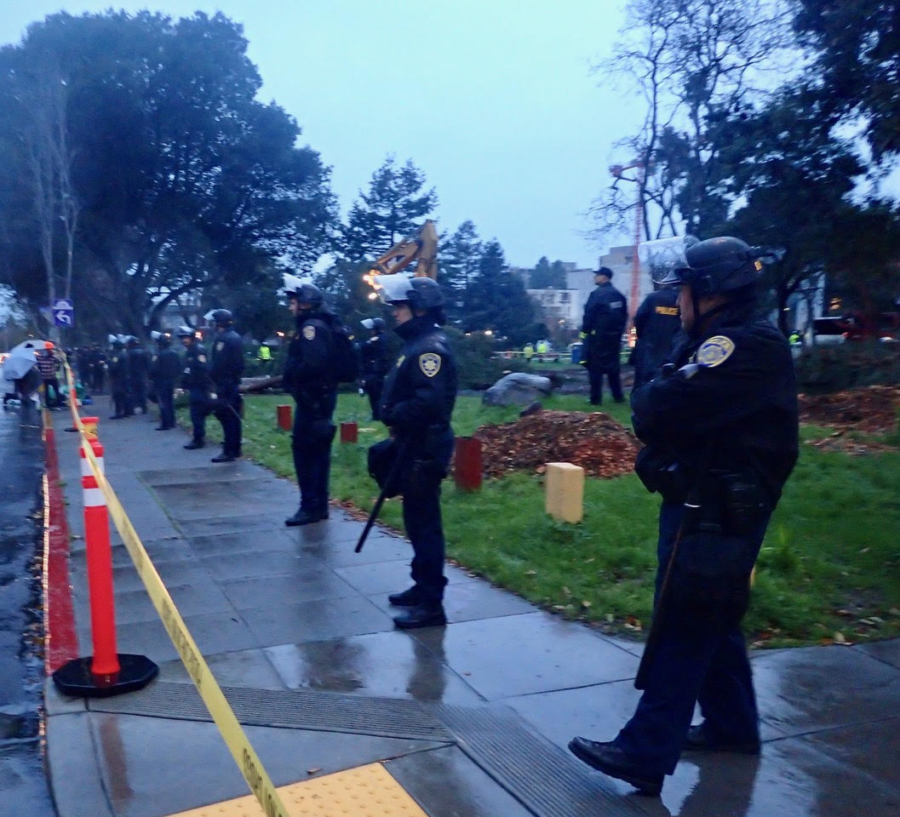
UC Berkeley says it was simply doing “routine tree maintenance,” but community members aren’t so sure.
On January 15, UC Berkeley police and officers from other campuses swooped down on People’s Park early in the morning to oust a small encampment that had been set up to stop the cutting of trees at the park. Six people were arrested.
An estimated 100 to 150 police officers arrived at the Southside park around 4:40 a.m. to clear the park so crews could start cutting around 5 a.m., according to Lisa Teague, a park advocate who lives across the street.
About eight people were sleeping in a small tent encampment that had been set up on the southeast side of the park on January 4, according to a UC Berkeley press release, right near where a tree crew cut down 42 trees on December 28. That corner is where Hate Man, a well-known park denizen, once hung out before he died.
At times over the past 11 days, the number of people in the encampment during the day had varied from between 10 and 50, according to UC Berkeley. One man had been sitting in a tree for about four days to protest the university’s plan to cut it down, said Teague.
UC Berkeley police had been warning those at the encampment since January 7 that it was illegal to sleep in the park, and that it had been illegal to do so for 20 years. Officials told the park tree advocates that there were beds available in Berkeley shelters. When police encountered campers Tuesday morning, six of the eight people sleeping in tents were arrested, according to the Cal statement.
Tree crews cut down the five remaining trees they had not been able to access on December 28 because activists had sat in front of them. The arborists also removed a number of stumps.
‘The sum of the park is more than the trees. The whole park is precious.’
UC Berkeley police cordoned off the perimeter of the park Tuesday and have stationed officers inside the park as well. The California Highway Patrol assisted in this morning’s actions too, said UC Berkeley officials.
UC Berkeley officials said they removed 42 trees at the park as part of routine maintenance. The work was done simultaneously with work at about a dozen other sites around campus.
In a sad irony, a 250-foot eucalyptus north of the Greek Theater toppled during a heavy rainstorm on January 6, killing 32-year-old Novato resident Alexander Grant. UC Berkeley is investigating why that tree fell. The eucalyptus was not tagged as part of the university’s tree maintenance work.
Also ironic, said Teague, was the fact that a juniper tree in People’s Park toppled during that same rainstorm. The juniper was not one of the trees UC Berkeley said was stunted or diseased and had to come down.
Teague lamented the loss of so much green in the park and said the struggle to save the park will continue. Cal has announced it plans to build a housing complex on the site in 2020 to serve both students and formerly homeless people.
“The sum of the park is more than the trees,” said Teague. “The whole park is precious. The loss of the trees is personally devastating to most of us, but we will continue the fight for the whole park.”
UC officials said that the tree work is not connected to the plan to build dorms and supportive housing.
In the press release, UC Berkeley officials explained why they had allowed the encampment to exist for 11 days:
“The campus views the current camping activity as an occupation protest. When it comes to protest management and response, the University exercises patience in order to avoid conflict and confrontation, and always seeks to exhaust efforts to resolve occupations through communications with protestors prior to using force. Given that there has been no overnight camping in the park for more than 20 years, the campus hoped for a return to the status quo and urged those who oppose the tree maintenance to voluntarily dismantle the encampment and vacate the property at night. It is highly unfortunate that those efforts failed in this instance. We regret that precious campus resources must be used, and law enforcement officers diverted from their usual duties, so that the campus can meet its responsibilities to provide for public safety and maintain its property.”
Teague said that, in a funny way, the university’s latest action has backfired as it focuses more attention on the park, which will turn 50 in May.
“I think this is going to galvanize people, especially the way [the police] came in,” said Teague. “The community will become more aware of what is going on.”
This article originally appeared in Berkeleyside.
Frances Dinkelspiel is the co-founder of Berkeleyside.
